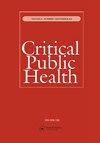权衡未来:英国国家儿童测量计划家庭观念的元民族志
IF 2.3
3区 医学
Q2 PUBLIC, ENVIRONMENTAL & OCCUPATIONAL HEALTH
引用次数: 1
摘要
摘要英国国家儿童测量计划(NCMP)是一项国家授权的公共卫生计划。它在公共卫生成果框架中提供了儿童超重指标的数据,这是政府减少儿童肥胖方法的一部分。根据家庭成员对该计划经历的元人种学综合,我们将NCMP概念化为一种“未来技术”,以产生新的见解,了解它如何以潜在的有害方式(重新)塑造和(重新)想象超重儿童、父母和看护人过去、现在和未来的责任和做法。对于被NCMP归类为超重的儿童来说,NCMP是一个具有情感意义的事件,它推动了新的身体实践、新的饮食实践以及与同龄人关系的改变。这篇论文概述了父母是如何抵制和重新制定该计划及其结果的,以保护他们的孩子免受以体重为中心的未来的影响。他们认为欺凌、饮食失调和心理健康后果的潜在风险比未来超重的风险更重要。我们展示了被归类为超重儿童的父母如何在同龄人中保持他们对“负责任”和“良好”育儿的主张,同时将儿童肥胖的责任转移到其他“不负责任”的父母身上,从而再现了NCMP和相关研究的“行为改变”信息中固有的道德和责任话语。最后,我们考虑到该计划的一个核心矛盾,即使用NCMP人口层面的监测数据来(重新)塑造个人和社会层面的生活——它旨在帮助的儿童最有可能因此受到伤害。本文章由计算机程序翻译,如有差异,请以英文原文为准。
Weighing up the future: a meta-ethnography of household perceptions of the National Child Measurement Programme in England
ABSTRACT The English National Child Measurement Programme (NCMP) is a nationally mandated public health programme. It provides data for child excess weight indicators in the Public Health Outcomes Framework, part of the government’s approach to reducing childhood obesity. Drawing on a meta-ethnographic synthesis of household members’ experiences of the programme, we conceptualise the NCMP as a ‘technique of futuring’ to generate new insights into how it (re)shapes and (re)imagines past, present, and future responsibilities and practices for overweight children, parents, and carers, in potentially harmful ways. For children categorised by the NCMP as overweight, the NCMP is an emotionally significant event, driving new bodily practices, new food practices and changed relationships with peers. This paper outlines how parents come to resist and reframe the programme and its results, to protect their children from a weight-focused future. They consider the potential risks of bullying, dysfunctional eating, and mental health consequences more important than future risks of overweight. We show how parents of children categorised as overweight preserve their claim to ‘responsible’ and ‘good’ parenting amongst peers, whilst shifting the blame for childhood obesity to other, ‘irresponsible’ parents, thus reproducing moralising and responsibilising discourses inherent within the ‘behaviour change’ messaging of the NCMP and associated research. Finally, we consider a central paradox of this programme and the use of NCMP population level monitoring data to (re)shape lives at the individual and social level – the children it sets out to help are the most likely to experience harm as a result of it.
求助全文
通过发布文献求助,成功后即可免费获取论文全文。
去求助
来源期刊

Critical Public Health
Multiple-
CiteScore
5.90
自引率
7.10%
发文量
36
期刊介绍:
Critical Public Health (CPH) is a respected peer-review journal for researchers and practitioners working in public health, health promotion and related fields. It brings together international scholarship to provide critical analyses of theory and practice, reviews of literature and explorations of new ways of working. The journal publishes high quality work that is open and critical in perspective and which reports on current research and debates in the field. CPH encourages an interdisciplinary focus and features innovative analyses. It is committed to exploring and debating issues of equity and social justice; in particular, issues of sexism, racism and other forms of oppression.
 求助内容:
求助内容: 应助结果提醒方式:
应助结果提醒方式:


